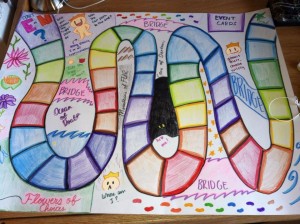E125 Ethics Proposal – Would You Rather? (App) – Sean Thomson, Alan Christopher, Lingmiao Wang, Jack (Keug Jae) Bang
Motivation
The world has been growing more and more connected for most of modern history, and there is no reason to believe that this trend will change in the near future. As a result, people of all professions, and engineers especially, will be faced with numerous ethical challenges which simply wouldn’t have mattered in the past (e.g. is accepting substantial gifts acceptable if the established culture in which you are working accepts them, or should you adhere to the standards of the culture in which you were trained). Additionally, this global interconnectedness means the effects of products will have wider reaching effects than they might otherwise have, making it especially important that engineers be able to behave ethically. Unfortunately, ethics is not a topic which is thoroughly studied within most curricula. Our proposed application seeks to partially remedy this lack of engagement with ethical issues by giving engineers a convenient, engaging means of delving into and solidifying their ethical framework. Specifically, users of the application will be asked to determine which of two courses of action is morally preferable, and as a result be forced to consider moral conundra more thoroughly. We feel that this “learn by doing” approach is useful and appropriate first because it is engaging and voluntary, and second because we feel there is no better way to train individuals to recognize and resolve ethical dilemmas than by asking them to do just that. Additionally, we propose to use our application to gather anonymous information regarding the positions engineers (and perhaps other professionals) take on ethical issues. This information can then be used to help guide policy decisions, as well as to help shape ethics curricula.
Proposal
Our proposed product is an application with three levels of functionality. The first level is a “quick play” mode where the user is presented with two sets of images (left column and right column). Each set represents a different (ethical) scenario/item with the two pictures of each scenario depicting different aspects of that scenario. The user then has to decide which scenario is preferable. There is also the option to skip the displayed combination of so desired. The second level is more in depth and uses written scenarios rather than just images. It follows the same process whereby the user has to pick the preferable scenario but it allows the user to consider much more complicated scenarios and allows us to present the user with scenarios which cannot be condensed into images alone. The final level is a feedback screen where the user can review his choices and view trends data from just his responses as well as trends from the community of users. This screen also allows the user to browse scenarios by category (i.e. energy, manufacturing, business, etc).
This application forces the user to reflect on ethically controversial scenarios and by visually presenting different aspects of the scenarios, encourages the user to expand his thought process. Most importantly, the application forces the user to make an ethical decision of “which is more acceptable” taking the process from reflection to action. The application mockup was created on a web platform but can easily be adapted for mobile or tablet.
Logistics
Our primary objective will be to target a perceptive audience operating within the confines of engineering new technology and the onslaughts of the actions taken within these realms (i.e. engineers, businessmen/women, investors, stockholders). Although the product assumes some level of ethical background and knowledge on the presented scenarios, this level is quite small hence affording the general public to participate and assist in standardizing the ethical norms in our business practices and innovations. In order to secure revenue we will be approaching the funding aspect from multiple angles. In our initial implementation we will be aiming to develop a phone app which will either be made available for free with the stipulation that advertising be included in the interface, or for a small fee, the app can also be acquired free of advertising. A second means of funding will be to offer an incentive program for advertisers for a fee. By participating in this program advertisers award small monetary valued points (i.e. 1¢) each time a user accesses the app and completes a specified number of scenarios. Points are then redeemable with either said advertiser or affiliated companies. A third method for obtaining funds, which also highlights one of our main objectives in establishing this app, is to extract the resulting data and provide it as a commodity to interested parties such as engineering companies, future advertisers, and other participating stakeholders. Our hope is that these companies will use this information, perhaps in their recruiting processes, to continuously re-establish the standard of ethical thinking in engineering practices. Our presentation also includes some initial projections for startup funding, and how our product will proceed based on those parameters. Obviously with better startup funding comes a more user-friendly app and in turn a more substantial consumer base, hence garnering more accurate and efficient data collection. This enhanced sense of data collection will generate a clearer picture of the idea of ethical inclinations and their influence and engagement in modern engineering endeavors. We anticipate a short timeframe (1-2 months) for initial product execution and continuous product modification upon the initial release as revenue and consumer participation develops.
Appendix A: Proposal Mockups
Figure 1: Quick Play Mode depicting 3D printing vs animal drug testing
Figure 2: In Depth Scenarios Mode depicting DC-10 and Challenger accidents
Figure 3: Results Mode
Appendix B: Quick Play Sample Scenarios
Figure 4: Animal drug testing vs. 3D printing
Figure 5: Design (Efficiency) vs. National Security
Figure 6: Hydro Power vs. Solar Power
Figure 7: Automated Driving Cars vs. Genetically Engineered Children

